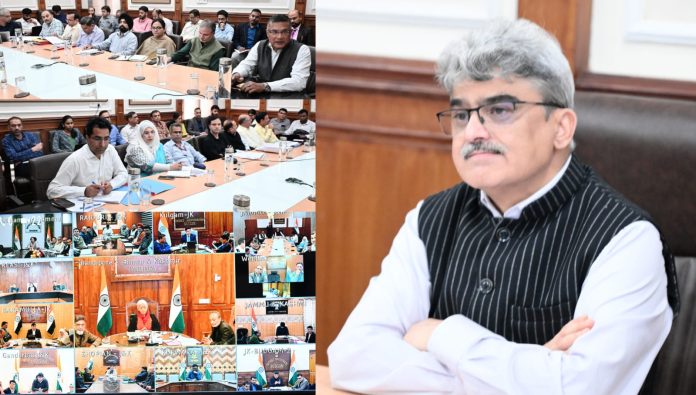JAMMU: Chief Secretary, Atal Dulloo, today chaired a comprehensive review meeting to assess the progress made in the implementation of the Jammu and Kashmir Climate Investment Project (JKCIP) and the Kisan Khidmat Ghar (KKG) programme aimed at strengthening the agriculture sector across all districts of the Union Territory.
The meeting was attended by Additional Chief Secretary, Agriculture Production Department; Managing Director HADP; Heads of Departments of the Agriculture Production Department and other senior officers.
Deputy Commissioners of all districts participated through video conferencing.
During the meeting, the Chief Secretary emphasized the need for effective on-ground implementation and continuous monitoring of these flagship programmes to ensure that their intended benefits reach the farmers in a time-bound manner.
He directed the Deputy Commissioners to actively engage with farmers and beneficiaries, identify any bottlenecks in delivery, and ensure timely resolution of issues to maximize public benefit.
The Chief Secretary also highlighted the importance of field visits by senior officers to independently assess progress and gather first hand feedback from the general public. He underscored the significance of inclusive participation, urging all stakeholders to ensure that women, youth, and vulnerable communities receive their due share as envisaged under the schemes.
He advised the officers to collaborate closely with women Self Help Groups (SHGs) under JKRLM to achieve programme targets and to utilize Mission YUVA data for reaching out to youth and vulnerable groups through focused awareness campaigns.
He further called for streamlining approval processes to enhance public convenience and motivate greater participation. The Chief Secretary directed Deputy Commissioners to review approval rates at District Level Committees (DLCs) and identify areas for improvement.
Speaking on the occasion, ACS, APD, Sh. Shailendra Kumar informed that the programme targets 90 identified blocks across J&K, focusing on women (47%), youth (30%), and vulnerable communities (10%).
He stated that the initiative aims to promote climate-smart and market-led production, develop a robust agribusiness ecosystem, and extend targeted support to vulnerable groups to substantially improve their incomes.
He added that since the launch of the programme portal in June this year, significant progress has been made. Applications worth Rs47 Cr have been approved through DLCs during the previous month, reflecting growing creditworthiness and beneficiary participation. The Annual Work Plan for the current financial year stands at Rs150 Cr.
Providing an update on implementation, MD HADP, Sh. Sandeep Kumar, informed that the programme covers approximately 90,000 women households, 1.29 lakh youth, and 30,000 vulnerable households.
So far, 20,873 registrations have been received with 20,006 applications submitted and 9,823 approvals granted. These include 13,907 applications under the Climate Smart & Market-led Production component, 989 under the Agribusiness Ecosystem Development, and 5,110 from vulnerable community members.
He further reported that 436 functional units have been established covering 7,156 kanals of land, with an overall approval rate of 54% in Jammu and 47% in Kashmir divisions.
To enhance awareness and build capacity among target groups, 264 rural credit workshops have been organized across 90 blocks, engaging over 22,000 participants including 3,100 women. These outreach activities were conducted under the themes of ‘MAATI’, ‘Yuva Vani’, and ‘Karvaan’ for women, youth, and vulnerable communities respectively.
Reviewing the progress of JKCIP, it was informed that the project has recorded varying degrees of success across its components. While Area Expansion has achieved 43% of its 16,459 kanal target, other components such as hiring of FPO Development Officers (100%) and Exposure Visits (87%) have performed strongly.
The meeting also noted progress in Water Management Systems, Protected Cultivation, Sheep and Mushroom Units, Buyer-Seller Meets, and Bootcamps, with achievement rates ranging between 32% and 81%.
The Chief Secretary directed all stakeholders to maintain close coordination, ensure effective ground-level implementation, and expedite activities under both programmes to achieve the intended outcomes of enhanced farmer income, climate resilience, and agricultural sustainability in Jammu and Kashmir.


